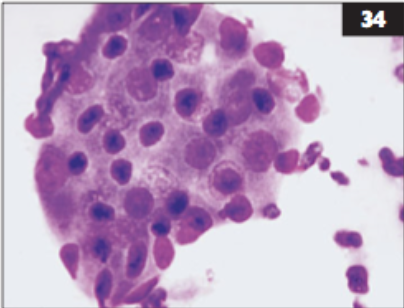Difference between revisions of "Cytology Q&A 07"
Ggaitskell (talk | contribs) (Created page with "{{Template:Manson}} [[Image:|centre|500px]] <br /> '''A ten-year-old entire male Beagle presents with multiple nodular enlargements surrounding the anus. This is associated w...") |
Ggaitskell (talk | contribs) |
||
| (One intermediate revision by one other user not shown) | |||
| Line 1: | Line 1: | ||
| − | {{Template:Manson}} | + | {{Template:Manson |
| + | |book = Cytology Q&A}} | ||
| − | [[Image:|centre|500px]] | + | [[Image:Cytology 07.png|centre|500px]] |
<br /> | <br /> | ||
Latest revision as of 14:55, 29 September 2011
| This question was provided by Manson Publishing as part of the OVAL Project. See more Cytology Q&A. |
A ten-year-old entire male Beagle presents with multiple nodular enlargements surrounding the anus. This is associated with ulceration and bleeding and is accompanied by a disagreeable odour. Fine needle aspiration is performed and smears prepared (Wright’s, ×100 oil).
| Question | Answer | Article | |
| What is the most likely diagnosis? | The clinical signs, signalment and cytological observations are most consistent with perianal adenoma. |
Link to Article | |
| What therapy would you recommend? |
Note: The cytological features of perianal adenoma are classic in this case.
Perianal adenocarcinoma is less common and exhibits more bizarre and/or variable features compatible with malignancy. It may present as a relatively undifferentiated malignancy cytologically and require surgical biopsy and histological evaluation to confirm cell type of origin. |
Link to Article | |
